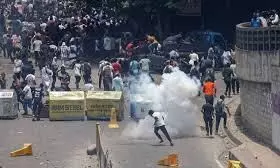
Bangladesh student group suspends protests for 48 hours amidst rising death toll
text_fieldsThe leading Bangladeshi student group behind recent demonstrations that escalated into deadly violence has announced a temporary halt to their protests for 48 hours.
This decision was made to push for government action to address their demands.
Nahid Islam, the head of Students Against Discrimination, communicated the suspension from his hospital bed, where he is recovering from injuries allegedly inflicted by undercover police.
The protests, initially aimed at reforming politicized admission quotas for government jobs, have become one of the most severe challenges to Prime Minister Sheikh Hasina's administration. A curfew has been implemented, soldiers are patrolling urban areas, and an internet blackout since Thursday has significantly hindered the flow of information.
Islam said, "We are suspending the shutdown protests for 48 hours," emphasizing that they did not seek reform "at the expense of so much blood." He called for the government to lift the curfew, restore internet access, and cease targeting student protesters during this period. Despite the partial victory, he lamented the high cost, saying, "We did not want quota reform at the expense of so much blood, so much killing, so much damage to life and property."
The protests intensified after the Supreme Court reduced the number of reserved jobs for specific groups, including descendants of freedom fighters from Bangladesh's 1971 liberation war.
Violence has claimed at least 163 lives, including police officers, with sporadic incidents continuing. An AFP reporter witnessed four people being brought to Dhaka Medical College Hospital with bullet injuries on Monday.
Government officials have repeatedly blamed the protesters and opposition for the unrest. Dhaka Metropolitan Police spokesman Faruk Hossain reported the arrest of "at least 532" individuals in the capital, including leaders of the opposition Bangladesh National Party.
Ali Riaz, a professor of politics at Illinois State University, described the violence as "the worst massacre by any regime since independence," criticizing the government's reliance on brute force.
Diplomats in Dhaka have also questioned the government's heavy-handed response. During a briefing, US Ambassador Peter Haas challenged Foreign Minister Hasan Mahmud's one-sided portrayal of the events, pointing out the omission of footage showing police firing at unarmed protesters.
The quota system, which reserves jobs for descendants of freedom fighters, has been a point of contention, especially given the acute job crisis faced by graduates.
Although the Supreme Court reduced the reserved jobs from 56 percent to seven percent, most positions remain allocated for freedom fighters' descendants, falling short of protesters' demands to eliminate the category entirely.
Critics argue that the quota system allows the ruling Awami League to fill public jobs with loyalists.
Prime Minister Sheikh Hasina, who has been in power since 2009 and secured her fourth consecutive election in January, faces accusations from rights groups of misusing state institutions to maintain power and suppress dissent, including extrajudicial killings of opposition activists.























